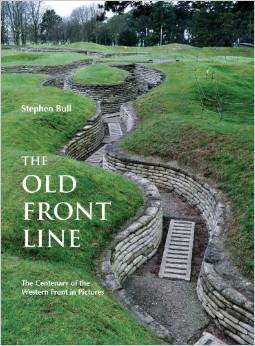Back in the 1980s when it was still possible to walk areas of the Western Front and find a considerable amount of the debris of battle still in situ, I picked up a paperback copy of Lyn MacDonald’s Sommein a bookshop in the West End of London. I spent a week in a freezing seaside cottage reading it from cover to cover and knew then that I really had to learn much more about the Great War.
As a child in the 1960s I had seen the old men march on Remembrance Sunday and marvelled that I could hear the guns firing at 1100 but I was dislocated from the war. My grandfathers had died before I was born and my family had no tangible link to the conflict. My Uncle Jim stayed with us one time when his wife was in hospital and I happened to see him one morning without his customary collarless shirt. His chest was peppered with little scars and he looked at me in the fug of smoke that he propelled everywhere from a perpetually lit rolled up cigarette and said “Son, whatever you do, don’t get any of these.”
Where Jim fought and what he saw I do not know. But I salute him now as I do most days. Just one more cockney bloke who had fought in the war and come home. But his memory, he died in 1972, never fades in my heart. In every respect I send the same greeting down the decades to all the Uncle Jims and remind myself that in Somme Lyn MacDonald had evoked the gospel of Saint Mark with My name is Legion: For we are many.
To my mind those who served my country in the Great War are our Greatest Generation. I don’t diminish the people of World War II in any way; but the people of 1914-18 won Britain’s greatest victory in the field in a host that was Britain’s biggest ever army. There will be nothing like it again.
Somme launched me into an education that continues to this day. I did not get on the trail until 2004 but in the ten years that have passed I have had some of the most wonderful and memorable experiences with my friends and family. They have been the best years of my life. This September I went to Gallipoli and it was a magical culmination to a decade of pilgrimage. Next year my friends and I are planning to head for Verdun. I have seen some of the battlefield already, but a deeper connection is essential.
The centenary of the Great War will not resonate in every household and I am wary, anyway, of the event junkie element who attach themselves to media hype.
I avoided Normandy this summer for the same reason, despite my regrets; and will not go anywhere near the major Great War sites on the anniversary dates.
My friend John set the tone a while ago explaining how he once had to rescue an elderly veteran and his wife at Mons where they had been abandoned by a newspaper hack after being taken there for a shallow photo opportunity.
The real Western Front experience is only found by getting out there yourself on the quiet days in all weathers. There is a lot to see. Now, I have a Facebook page for my battlefield photography and reflections, but if I was going to do a book it would look very much like this one from Stephen Bull. Borrowing it’s title from the great John Masefield, it’s almost as if I had made the book myself, such is the similarity to much of the way I practise photography and how I would want to present my case in print. This makes reviewing the book quite a challenge because I might be tempted to rip it up in a fit of jealousy. But that wouldn’t get us anywhere. I have many favourite battlefield books and this one will join them. I put it up there with Fields of Memory, my long time favourite. It is a book I will enjoy revisiting again and again.
So what does this mean for you? It isn’t a guide book as such, but if you don’t feel inspired to get out on the trail having read it; then I suggest you stay at home and stick to televised contests of singing, dancing or baking. Fill your boots. But if you do want to get beyond the essential reading so you can do some actual walking in the footsteps of heroes, then what you have here is something like a catalogue to entice you. It all works for me. Despite being a book of photographs, it does not lack substance or quality. This one is for keeps, just like my memory of Uncle Jim and his ever smouldering fag and a closer connection to a twenty year old lad resting forever in a triangle of land just outside Ypres – my great uncle Leslie.
Les was unknown to me for years, just as I explained at the start; my family had no tangible connection to the war. Except that we did. Les had been outwardly forgotten by an older generation who preferred to store their memories away rather than wear them like colourful coats and he remained lost until by chance my searching hand found a Death Plaque in a dark bureau drawer. We cannot bring Les home in body but he is always with us in spirit. Your Great War is out there and you only have to seek and you shall find. It can be confusing and not a little vague, like one of those word search quizzes when there is one you just cannot find. Stephen Bull might help you join the dots on a puzzle of your own. I hope he does.
THE OLD FRONT LINE
A Centenary of the Western Front in pictures.
By Stephen Bull
Casemate
ISBN: 978-1-61200-230-9
